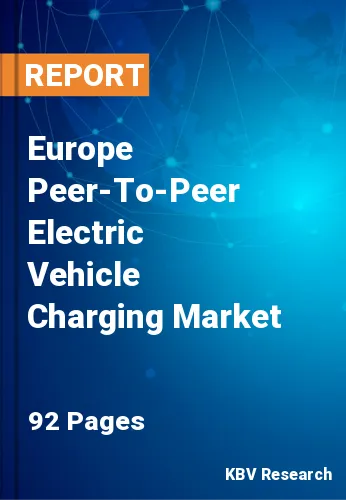The Europe Peer-To-Peer Electric Vehicle Charging Market would witness market growth of 20.1% CAGR during the forecast period (2022-2028).
The seamless integration of electric vehicles and energy storage systems is a priority for EV automakers and original equipment manufacturers (OEMs). As a result, the desire for peer-to-peer electric vehicle charging is projected to rise. Furthermore, governments all over the world are working on providing sufficient space for electric vehicle supercharger networks to be installed in residential areas.
Allowing consumers to rent out chargers to the public for a fee can greatly expand the number of charging stations available. P2P networking can make charging points available internationally with little to no expenditure, just by exploiting existing infrastructure that would otherwise remain idle. As a result, range anxiety will be reduced, and EV adoption will increase. This strategy may also provide an additional market edge to new EV manufacturers, as the accessibility of commercial charging point’s particular to car manufacturers, such as Tesla, is a considerable advantage major manufacturers enjoy due to existing infrastructure investments. New entrants to the market, like Byton, may benefit from the existence of private charging infrastructure.
Several European countries set lofty goals for carbon reduction and electric vehicle stock requirements by 2020. In addition, some European countries, like France and Belgium, are concentrating on the construction of electric vehicle charging and support infrastructure to accommodate interoperability between different electric vehicles across the region.
The European Vehicle Manufacturing Association's second position paper recommends equipping public charging points with IEC 62196 Type 2 Mode 3 connectors, with transitional solutions allowed until 2017. Despite this, a variety of socket types Chademo, and normal house socket outlets Mode 2 have previously been installed. Politicians have urged for a unified European standard, and the EU will establish infrastructure needs by legislation in 2013 in the event of a market failure.
The Germany market dominated the Europe Peer-To-Peer Electric Vehicle Charging Market by Country in 2021, and would continue to be a dominant market till 2028; thereby, achieving a market value of $24.3 million by 2028. The UK market is experiencing a CAGR of 19.1% during (2022 - 2028). Additionally, The France market would exhibit CAGR of 21.2% during (2022 - 2028).
Based on Application, the market is segmented into Residential (Apartments and Private Homes) and Commercial (Destination Charging Station, Fleet Charging Station, Workplace Charging Station, and Others). Based on Charger Type, the market is segmented into Level 2 and Level 1. Based on countries, the market is segmented into Germany, UK, France, Russia, Norway, Netherlands, and Rest of Europe.
Free Valuable Insights: The Global Peer-To-Peer Electric Vehicle Charging Market Size will Hit $363.4 Million by 2028, at a CAGR of 20.6%
The market research report covers the analysis of key stake holders of the market. Key companies profiled in the report include ChargePoint Holdings, Inc., Enphase Energy, Inc. (ClipperCreek, Inc.), Enel X Italia Srl (Enel Group), EVBox (Engie SA), EVmeter LTD., Shell Recharge Solutions (Shell plc), Innogy SE (E. ON SE), Power Hero, Inc., and Webasto Group.
By Application
By Charger Type
By Country
Our team of dedicated experts can provide you with attractive expansion opportunities for your business.

